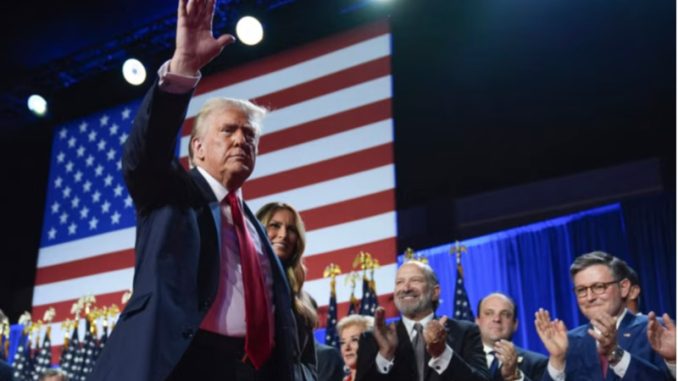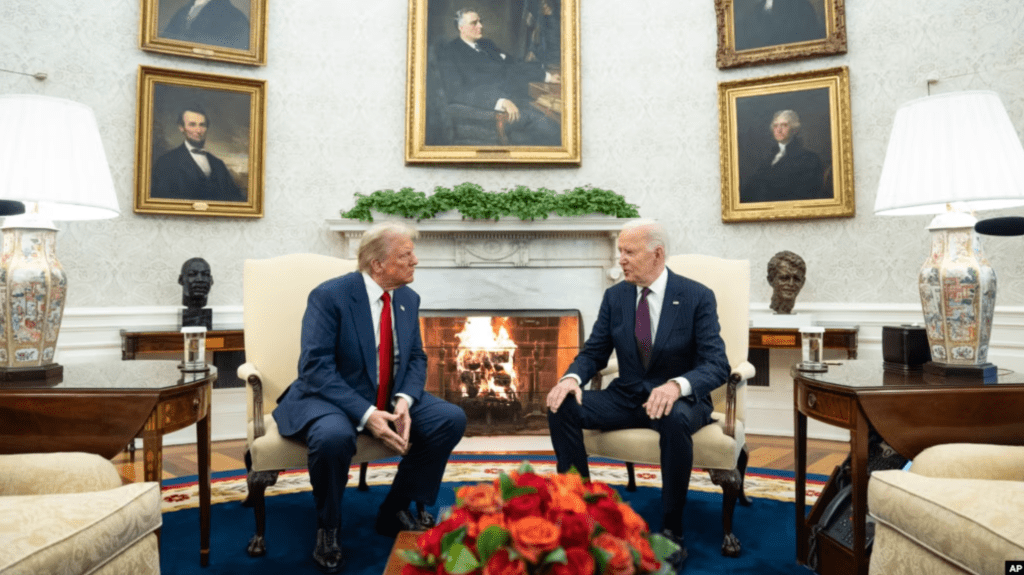
By Obinna Ejianya (9News Nigeria – Melbourne, Australia)
The recent U.S. presidential election delivered a surprising turn of events, as Donald Trump emerged victorious once again, securing his return to the White House. The fierce and polarizing campaign saw Trump up against a significant Democratic contender, Vice President Kamala Harris, who took up the challenge after President Joe Biden stepped down due to health concerns and party pressures. This election saw Trump’s remarkable escape from multiple assassination attempts, which some attributed to divine intervention. Ultimately, Trump clinched the win, sweeping key swing states and marking his return to power.
With his campaign focusing heavily on themes of “Immigration,” “America First,” and strict economic policies, Trump’s victory signaled a resurgence of these priorities. Now that he’s set to implement his agenda from day one, the world, particularly Africa and Nigeria, is preparing for the implications of his policies. His reappointment of hardliners in his cabinet sends a clear message: this administration will act decisively on the promises made during his campaign.
Given Trump’s track record and the appointments he’s already made, we can expect a presidency that aggressively pursues stricter immigration policies, a focus on American economic interests, and an intensified stance on religious persecution and extremism. This in-depth analysis examines the probable impact on Africa, especially Nigeria, considering the pros and cons of Trump’s policies, his governance style, and the early signs of his administration’s intended direction.
Historical Context of Trump’s Policies on Africa
During his first term, Trump’s approach to Africa mixed criticism with selective strategic initiatives. While he sharply criticized African leaders for corruption and poor governance—a stance some considered blunt but necessary—he also introduced programs like Prosper Africa, designed to increase U.S. investments on the continent. Through the Development Finance Corporation (DFC), his administration provided funding for development projects, fostering U.S. business ventures in Africa. However, his tenure was also marked by significant cuts to foreign aid and a protectionist trade stance, casting uncertainty on the future of U.S.-Africa relations.

- The Policy Blueprint: Trump’s “America First” Doctrine Returns
At the core of Trump’s campaign was a promise to prioritize America’s economic interests, a stance expected to shape his policy toward Africa. In his first term, Trump emphasized reducing America’s dependence on foreign countries and introduced protectionist trade policies aimed at bolstering U.S. industries. His re-election has revived this “America First” doctrine, which entails favoring U.S.-centric deals and renegotiating or even retracting trade agreements that, in his view, disadvantage American businesses.
For Africa, this could mean a possible overhaul of trade initiatives like the African Growth and Opportunity Act (AGOA), which grants African countries duty-free access to U.S. markets. If Trump seeks to alter or rescind AGOA, Nigeria could face economic setbacks, as access to the U.S. market is a key revenue source. With a focus on trade restrictions, Trump’s policies might limit the volume and scope of African exports to the U.S., potentially affecting Nigeria’s oil sector and its economic stability.
- Immigration and Travel Policies: Stricter Rules Ahead
Trump’s campaign heavily emphasized a hard stance on immigration, and his administration is set to execute these policies immediately. As early as his first term, Trump implemented travel restrictions targeting multiple African countries, including Nigeria, Sudan, and Tanzania, under the pretext of national security concerns. With the reintroduction of hardliners into his administration, a continuation of strict immigration policies is likely, potentially even more restrictive than before.
For Nigerians, this could mean tougher pathways to entry into the U.S., affecting students, skilled workers, and those seeking to reunite with family members. The impact of these policies could be twofold: while it may hinder Nigerians seeking better opportunities abroad, it could simultaneously pressure Nigeria’s leaders to create an environment that retains local talent. The “brain drain” phenomenon, marked by the migration of professionals and skilled workers from Nigeria, might slow if Trump’s policies restrict U.S. immigration options, provided Nigeria addresses critical economic challenges to make the country more livable for its citizens.
- Security Cooperation and Counterterrorism: Protecting Christians and Combatting Extremism
One area where Trump’s administration could positively impact Nigeria is in the spectrum of security and counterterrorism, with a focus on protecting Christian communities that face persecution. Trump’s stance on religious freedom has been clear, as he has spoken against the persecution of Christians, especially in regions like northern Nigeria, where religious extremists target Christian communities. His administration has been vocal about the rights of persecuted religious groups, and he could bolster U.S. support for Nigeria’s efforts to counter Islamic extremism that targets Christians.
This emphasis on religious freedom may translate to increased military aid and counterterrorism training for Nigerian forces battling Boko Haram, ISIS-affiliated groups, and other militant factions. However, there are concerns that Trump’s focus on security might come at the expense of other crucial support, such as economic aid and development assistance, which are essential for addressing the root causes of extremism. While military cooperation could strengthen Nigeria’s ability to fight extremists, a single-track focus on counterterrorism without addressing socio-economic challenges may not produce long-term stability.
- Trade Policies and “America First” Agenda: Opportunities Amidst Restrictions
One of the central concerns for African nations, particularly Nigeria, is the potential shift in trade policies under Trump’s administration. Trump’s “America First” agenda is centered on a more insular economic approach, which may adversely impact African exports to the U.S. market. For example, the African Growth and Opportunity Act (AGOA), which allows eligible African countries to export goods duty-free, is set to expire in 2025. Trump has previously expressed skepticism toward AGOA, which raises concerns that his administration may not renew the act. Losing AGOA benefits would significantly impact African economies that depend on U.S. markets, including South Africa and Nigeria.
The trade war between the U.S. and China presents an unexpected opportunity for African countries. As Trump’s administration imposes tariffs on Chinese goods, American companies may seek alternative suppliers for raw materials and goods. This shift could open doors for African exporters to fill supply gaps, potentially enhancing trade with the U.S. for countries like Nigeria. For African countries that can adapt to meet U.S. import demands, this development could prove economically beneficial.
While the “America First” agenda could reduce the scope for African countries to benefit from the U.S. economy, some aspects might still offer indirect benefits.
Trump’s stringent trade restrictions on China have the potential to cause an influx of Chinese investments and goods in Africa, as Chinese manufacturers seek alternative markets. Nigeria, as Africa’s most populous country and a significant market, could attract Chinese firms displaced from the U.S. market, potentially creating jobs and stimulating local industries.
However, this potential economic boon is not without risks. Increased dependency on Chinese goods could reduce Nigeria’s leverage in negotiating trade deals with other global powers. The presence of more Chinese businesses in Africa could also intensify the competition for local industries, impacting Nigeria’s manufacturing sector and increasing external debt if the Nigerian government continues to rely heavily on Chinese loans for infrastructure projects.
- Development Aid and Foreign Assistance: A Double-Edged Sword
Historically, Trump’s administration has shown skepticism toward extensive foreign aid programs, and his return to office may see cuts to these initiatives, which are vital to many African nations. Nigeria, for instance, has relied on foreign assistance for healthcare, education, and poverty reduction. U.S.-funded programs targeting diseases like HIV/AIDS, malaria, and tuberculosis could face reductions, directly affecting healthcare access and outcomes in Nigeria.
Nonetheless, Trump’s emphasis on self-reliance could encourage African nations to reduce dependency on aid and build sustainable internal resources. For Nigeria, this could mean prioritizing policies that foster economic independence, strengthen healthcare infrastructure, and improve education systems. Although challenging, a shift towards self-sufficiency could be beneficial in the long term, allowing Nigeria to determine its own developmental trajectory rather than relying on external aid.
- Diplomatic Relations: A Mixed Bag for African Leaders
Trump’s no-nonsense and often abrasive style of diplomacy has led to tense relationships with foreign leaders, and African nations are no exception. Trump’s outspoken criticisms of African leaders for corruption, inefficiency, and poor governance have been polarizing, with some viewing it as condescending, while others see it as necessary bluntness.
While some found his remarks undiplomatic, others saw value in his stance, as it highlighted issues that continue to hinder Africa’s progress. His insistence on accountability could serve as a wake-up call for African leaders, compelling them to address long-standing challenges and implement necessary reforms. By criticizing African leaders’ shortcomings, Trump indirectly encourages a higher standard of governance and accountability.
However, Trump’s return to the presidency may bring diplomatic challenges, as leaders who feel slighted by his remarks may be reluctant to cooperate closely. To maximize diplomatic benefits, African leaders, particularly those in Nigeria, will need to engage constructively with Trump’s administration, seeking common ground in trade, security, and development to mitigate potential diplomatic fallout.
The Road Ahead for Nigeria and Africa
In conclusion, Trump’s presidency undoubtedly presents both opportunities and challenges for Africa, particularly Nigeria. His hardline approach to immigration, focus on “America First” economic policies, and protective stance on religious freedoms suggest a complex set of policies that will require careful navigation. Nigeria stands to gain from Trump’s commitment to counterterrorism support, especially with respect to religious persecution, as well as from indirect economic opportunities resulting from U.S.-China trade tensions.
On the other hand, stricter immigration policies may curb the brain drain, keeping skilled professionals within Nigeria if the government can improve local conditions. Reduced aid could drive Nigeria towards self-reliance, but only if leaders rise to the challenge by developing robust economic policies that lessen dependency on foreign assistance. Additionally, the potential for strained diplomatic relations means that African leaders must prioritize strategic diplomacy, advocating for policies that benefit both sides.
In the end, Trump’s presidency presents a blend of risks and possibilities for Nigeria and Africa as a whole. By preparing for potential policy shifts and strengthening internal governance, Africa can seize opportunities amid these challenges and emerge more resilient in an evolving global landscape.
By Obinna Ejianya (9News Nigeria – Melbourne, Australia)
